Four Votes… or You’re Overboard
Consultant’s, Committee’s Bright-Lines could kill most Recovery Fund requests
by Robert Lynch, November 25, 2022
It’s akin to a college admissions committee’s rejecting your child’s application based on her SAT scores alone, and without ever having granted her the opportunity for an interview.

Buttressed by an out-of-town consultant’s coldly-objective, rigidly mechanistic evaluation of applicant paperwork, and following a frenetically-paced gleaning of those filings earlier this month by only a handful of lawmakers, a Tompkins County advisory committee stood poised this week to toss aside a full 62 per cent of the 212 applications filed by local businesses, charities, and governments that want to tap $6.5 Million in federal assistance to be funneled through Tompkins County’s Community Recovery Fund.
And contrary to earlier expectations, the applicants initially rejected during first-round committee review may find little, if any opportunity to revive their submissions prior to when the full County Legislature casts its only vote on final funding likely five days before Christmas.
The committee’s chosen four-vote-to-two line of demarcation would exclude from further review all but one Enfield funding application, that of the Enfield Community Council for an addition to its Community Center. Proposals by the Enfield Food Pantry and the Enfield Volunteer Fire Company, as well as several Enfield Town initiatives would each be denied any further review.
“There’s no way around having to say ‘no;’ the only way is through it” Chair Dan Klein stated at the start of a three-hour November 21st meeting of the Legislature’s Community Recovery Fund Advisory Committee.
“So we need to get this program across the finish line,” the Danby legislator continued. “The individual results are not going to be what everyone wanted, but I am confident that the overall effort of our decisions is going to be worthwhile and result in positive impacts to our county.”
Klein sounds confident. But others may not be so sure.
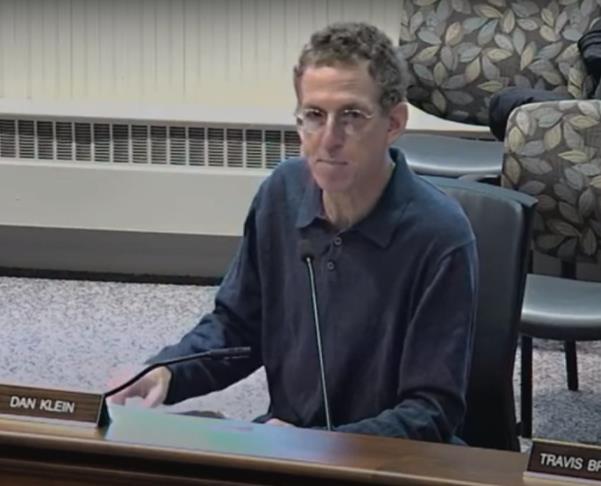
The six-member Advisory Committee’s triage of the $32 Million of funding applications this month has so far provided little evidence to instill public confidence. In first-round vetting of the program’s bigger-ticket items November 15th, charitable initiatives occasionally topping One Million dollars were routinely dispatched in minutes, if not seconds. Rules did not require legislators to explain their votes. Most usually did not.
And left undefended, member preferences, for lack of any other reason, appeared to rest on Rochester-based MRB Group’s scoring of applicant submissions utilizing the consultant’s multi-category, 70-point scale. MRB staff, zooming into committees meetings, never explained their rationale to the committee or to us.
What’s more, the whole evaluation process laid bare the exceeding amount of influence accorded just one or two members of Tompkins County’s current, 13-person Legislature; that is, anyone who was lucky enough to gain a committee appointment. Adhering to guidelines apparently set by MRB and tacitly embraced last Monday by the committee, a full two-thirds super-majority of the committee, four votes out of six, becomes necessary to keep an application alive for further consideration. Anything less—even a tied 3-3 vote—will not. The rule became firm only last Monday. But the committee cast most of its acceptance votes a full six days earlier.
Yes, it resembles the mid-point of a golf tournament. But in this case, where only a minority of the judgment team gets to decide how many golfers get cut.
“Can you define what ‘Yes’ means, at what ‘approved’ means?” Klein asked MRB’s Michael N’Dolo nearly two-thirds way into Monday’s meeting, Klein and legislator Anne Koreman still confused over where MRB arbitrarily struck its bright line. N’Dolo replied it had set four-votes-of-six as the threshold.
“We just lopped off 20 Million, and we only have eight (Million) more to go,” Klein reacted in a moment of understated glee, Klein’s remark coming after N’Dolo’s team had advised him that by limiting review to only the 80 submissions scoring four votes or higher, a more than $30 Million application total had been trimmed to just $14 Million. “That’s progress. That, to me, is encouraging that the end is in sight here,” Klein remarked. “We can do this.”
Maybe we can. But at what cost? And with what level of discretion, compassion, and nuance? Note how Klein’s comment remained dollar-focused and not need-focused. And is it right that any one or two legislators get to hold effective veto-power; to become an application’s executioner, especially when that single lawmaker may seek to supplant community-wide value with personal preference? A rogue legislator can put her thumb on the scales of balanced need. The heart can also yield to the checkbook.
“I want to be sure that… we’re all agreed that the only ones that we are going to be voting on are the four-or-more,” Legislature Chair Shawna Black sought to clarify, as MRB’s staff outlined a complex interactive computer program it will provide committee members to rank-choice certain funding applications. “And that no one’s going to bring back a ‘three’ or a ‘two’ or a ‘one’ because that would skew all of the other votes,” Black explained.
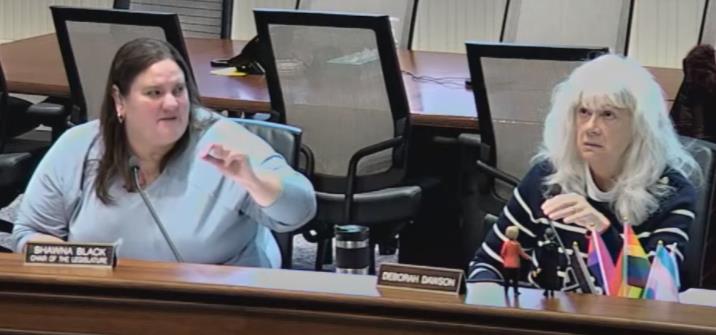
Reaffirming the consultant’s self-assumed role in the driver’s seat, MRB’s N’Dolo confirmed that only the 80, top-ranked candidates would remain “live” on its Excel pages. So as the committee fiddles with figures in the weeks ahead, assume projects like the Food Pantry and the Enfield Fire Company will become effectively forgotten.
But maybe not forever. Newfield-Enfield’s Randy Brown, the only non-committee member attending Monday’s meeting, zoomed-in and raised his hand, Brown noticeably skeptical of the committee’s inordinate power to deny.
“If something didn’t make it past your committee, can it be brought up by the total Legislature,” Brown asked.
“The answer is yes,” Klein responded. “We’ve designed into the process that when it gets to the full Legislature, any legislator can pull out any application for discussion.”
Then Brown threw out a second question, one to which he found an answer less to his liking. The Newfield rep requested that all legislators, not just committee members, be given copies of MRB’s Excel spreadsheet so they, too, can manipulate the numbers.
Klein polled the committee. Legislature Chair Black and Budget Committee Chair Deborah Dawson were heard to shout “no” off-camera. There would be no wider sharing.
“Well, I would like to do my own,” Brown rebutted concerning the committee’s self-confined game of budgetary musical chairs. “I would think all of the legislators should have opportunity to be part of the process.”
Those words tell us much. If Enfield or Newfield interests gained short shrift in the committee’s and consultant’s paring of priorities this month—as it appears they have—expect Randy Brown to step in and lobby for those local interests December 20th when the full Legislature will likely vote on the final funding package.
****
“I have increasingly come to understand for myself that there’s an emotional component to this process that we’re engaged in,” Klein acknowledged as the November 21st meeting had just begun its three-hour journey. “It’s difficult to say no.”
Klein’s statement rings true, for sure. But it also may ring hollow if agencies and their supporters come to conclude that the decision process has become skewed, arbitrary, and callous, while it concentrates excessive power in the hands and minds of too few and with those too distant from Ithaca and its unique mindset. Klein acknowledged one applicant emailed him earlier in the day to describe the committee’s rejection of its own agency’s request as “devastating.”
Nonetheless, the chairmen did little to placate critics’ fears or welcome their participation. “We are not having privilege of the floor for this meeting,” Klein said resolvedly Monday, thereby dismissing an unnamed number of citizen requests he admitted some had filed.
So the Star Chamber nature of the Community Recovery Fund Advisory Committee continues. Members set their next meeting for December fifth. A final recommendation may issue that day. But expect neither Enfield Food Distribution’s ambitious $1.6 Million building plan nor the Enfield Fire Company’s lesser-priced offering to be put on any list the committee prepares. The Pantry and Fire Company failed to make the cut. MRB’s highly-paid talent wants no more talk of them. Their only hope lies when final legislative votes get cast five days before Christmas.
That latter meeting could prove long. It could be contentious as well. Bright lines tend to do that. Randy Brown will be there.
###
Rocco Speaks; Shawna Bristles
Deidra’s Firing Returns to the Legislature
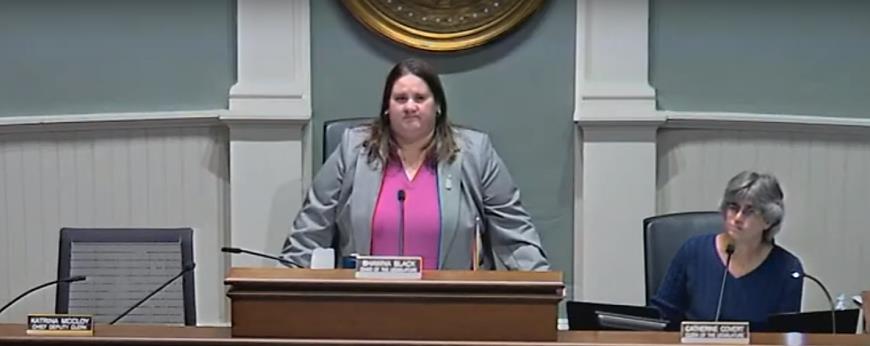
by Robert Lynch, November 18, 2022
Rordangate—yes, this writer’s term, and the name by which many around Trumansburg, we’re advised, now call this controversy—roared back into the Tompkins County’s Legislature’s chambers November 15th But the roar lasted for only three minutes. And the meeting’s Chair made certain it would not last for even one second more.
Rocco Lucente, the Ithaca builder and conservative activist whose interview allegedly prompted reporter Deidra Cross’s firing last summer, zoomed in at the start of the Legislature’s biweekly meeting and promptly launched into a blistering, staccato-paced critique of the Legislature in general, legislator Veronica Pillar in particular, and the County’s Director of Communications, Dominick Recckio, only by inference. You never saw Rocco’s face. But you could not have avoided Lucente’s voice… or his vitriol.
“We now live in a county where employees pressure publications to fire people for the crime of covering an activist with an opposing view, and County legislators support it,” Lucente scolded lawmakers. “I condemn County leadership for their defense of this heinous conduct—.”
“You’re done. Thank you. Anyone else here for public comment this evening?” a visibly shaken and audibly incensed Legislature Chair Shawna Black shouted into the room as she cut Lucente mic upon his final, 180th second of allowed privilege. For a brief moment, the room fell silent. Then the meeting resumed. No one talked further of the exchange.
And since Veronica Pillar had arrived late, taking her seat in the midst of Lucente’s rant, one would need to ask whether she, the prime target of Rocco’s rage, ever knew in real time what had just happened. Without a doubt, she knows by now.
“Veronica Pillar blatantly libeled me with several false, defamatory statements,” Rocco Lucente railed. “She called me a white supremacist, accused me of Alt-Right rhetoric, and displaying hate symbols. She claimed that I do not recognize people’s humanity. All of these claims are vicious lies.”
Freshman legislator Pillar drew Lucente’s ire for her own floor statements made two weeks earlier. At the Legislature’s November 1st meeting, the left-of-center Ithaca City representative commended government employees like Communications Director Recckio for taking the initiative to “push back and shut down” what she then termed “harmful, Alt-Right rhetoric,” as well as criticism that fails to “recognize everyone’s humanity.”
For the record, during her comments that earlier night, Pillar had never mentioned Rocco Lucente by name.
The Rordangate controversy began last April when reporter Cross interviewed Lucente about his pro-Trump activism, Cross then an employee of the print and online publication, Tompkins Weekly. After the Lucente story ran—and as revealed through a subsequent FOIL disclosure—Recckio contacted Tompkins Weekly’s editor to express his concerns about criticisms Lucente had made.
Then, in August, after Cross subsequently interviewed Trumansburg Mayor Rordan Hart and Hart had expressed his own opinions critical of the Ithaca City-Tompkins County Reimagining Public Safety collaborative, Recckio complained again. And after this second complaint, Tompkins Weekly fired Deidra Cross.
Tompkins County’s government-paid attorney in September cleared Recckio of any ethical wrongdoing. Tompkins Weekly has put distance between the Communications Director’s comments and the reporter’s firing. Yet at the November 1st session, Republican legislator Mike Sigler called for an outside counsel to investigate the matter. And Deidra Cross, for her part, has threatened to sue just about everyone.
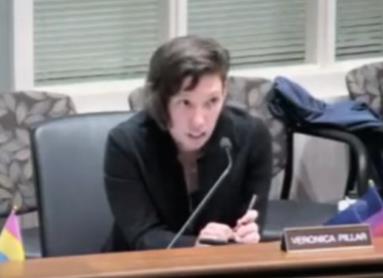
Yet, Lucente’s Tuesday night monologue targeted legislator Pillar for its harshest rebuke. Lucente referenced the then-private citizen’s alleged participation as a purported member of Ithaca’s Democratic Socialists of America in an October 16, 2020 standoff with Donald Trump supporters at local Republican Headquarters on Ithaca’s Meadow Street. In the incident, some campaign paraphernalia was burned, and according to Lucente, two women received minor injuries.
Media reports at the time cited Lucente as one organizer of the Trump side of the dueling demonstrations. Those reports neither quote nor picture Pillar as a participant.
“Make no mistake about it. The Ithaca Trump Rally Riot was our January 6th, and Veronica Pillar was the guy outside standing at the guillotine yelling ‘Hang Mike Pence,’” Lucente alleged in his statement to the Legislature. “Her rhetoric is designed to silence those who disagree with her, to motivate violence against them. That is exactly what it has done when conservatives have attempted to peacefully gather in our area,” Lucente continued.
But only when Lucente veered away from Pillar’s alleged conduct and focused his attack on Recckio’s actions in allegedly influencing Tompkins Weekly’s coverage, did Shawna Black intervene. Black reprimanded the Republican activist for his ever-so-close-to-the-line prohibited criticism of a named County employee. Lucente carefully had never referenced the Communications Director by name or by title.
“Bigotry against those who disagree with Democrats has become the norm,” Lucente stated midway through his critique. “The individual consequences against those who dare speak out in favor of conservative values has become the standard. This is why Deidra Cross was fired at the direction of the County. This is why your employee libeled me in an email to Tompkins Weekly. And this is why Veronica Pillar deployed vicious lies designed to motivate violence against me and people like me.”
Shortly thereafter, Shawna Black interrupted. “You’re coming close to the line about speaking with (sic) our County employees,” the Legislature’s Chair warned.
“You’re taking up my time, and I didn’t mention an employee, so I don’t appreciate interruption,” Lucente fired back to the presiding officer.
The conservative firebrand said a sentence or two more. But soon his time ran out and Shawna Black shut him down. It marked the end of Tuesday’s wake-me-up, three minute moment.
****
The remainder of the Legislature’s November 15th meeting proved bland by comparison.
The Budget: By a 12-1 vote, legislators adopted Tompkins County’s more than $200 Million 2023 Budget. Thanks to prior committee tinkering, the budget’s tax levy remains unchanged from that of the current year. And while the tax rate will fall, local spending will rise by nearly 6.7 per cent. Inflation-driven property assessments over the year will in many instances increase the bite on the average homeowner, but only slightly.
“I can’t support this budget,” Budget Committee Chair Deborah Dawson said in casting her lone dissenting vote. “After staff started to whittle down (the County’s oversized) fund balance judiciously,” said Dawson, “we just piled on.”
“There were a lot of ‘Christmas Tree Ornaments,’” Dawson complained, punctuating her words with flippant hand and facial gestures.
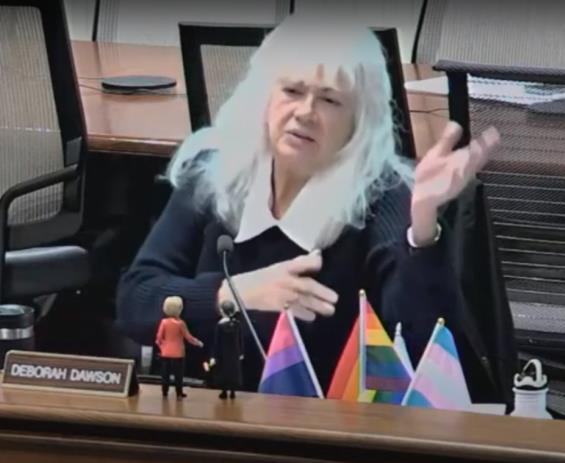
“I like this program; give me some money,” Dawson mocked her colleagues, accusing many for bending the budget to suit their own fancy. “And I have a problem with doing that,” she concluded.
“I don’t think there’s a person here who’s totally happy with all aspects of the budget,” Dryden’s Mike Lane admitted before casting his supportive vote. “But when you design a horse by committee, you may not get the tail in the right place.” Still, Lane added, “We did a good job.”
The Newspaper: Exercising its annual vote of frustration at the Gannett Press for its never-more covering local news, the Legislature grudgingly once again designated The Ithaca Journal, the only qualifying local daily, as its official newspaper for publishing legal notices.
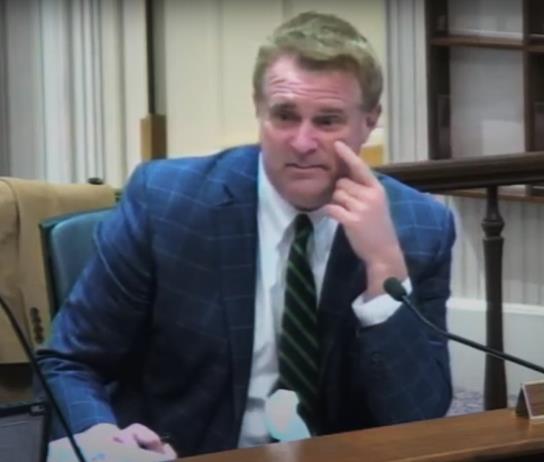
But this year, the action brought a twist. On its first round ballot, and with one legislative seat vacant, only seven voted to designate the paper. That’s one vote shy of a true majority.
“I’d kinda’ would like to see what the state does to us,” Mike Sigler, the Journal’s perpetual critic, said. He suggested the County Legislature call Albany’s bluff and refuse to fulfill its legal obligation.
Cooler heads then prevailed. The Legislature reconsidered and designated The Journal by a 10 to 3 vote.
###
Enfield Apps. on the Edge
Pantry comes up short in county’s first-round review
by Robert Lynch, November 17, 2022
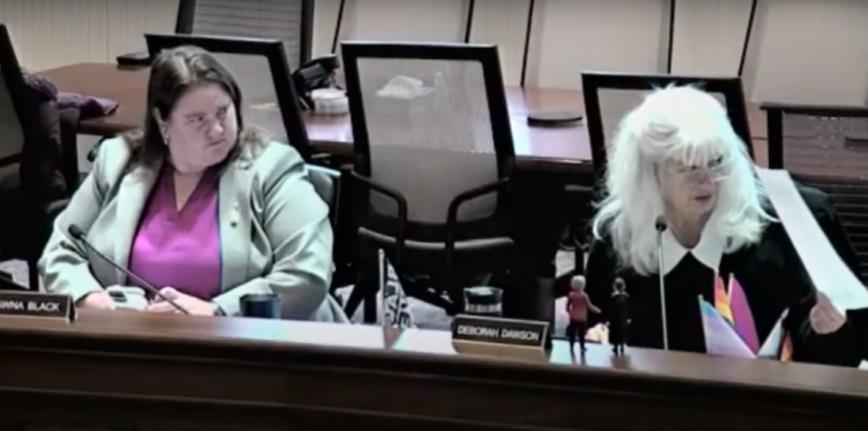
“It’s something, I hope, we can come back to knowing that our non-profits need structural help, but not under this program.”
Groton’s Lee Shurtleff drew a bright line against bricks-and-mortar. And because of that insistence, Shurtleff joined in a four-vote-to-two committee vote Tuesday to reject the ambitious request by Enfield Food Distribution (EFD) for moneys under Tompkins County’s Community Recovery Fund to replace EFD’s aged and undersized Food Pantry on the first floor of the Enfield Courthouse.
EFD’s $1.66 Million request is reportedly the largest single qualifying application of the 211 received countywide seeking a chunk of the $6.5 Million Tompkins County seeks to distribute to agencies, businesses and local governments as pass-through appropriations from the federal American Rescue Plan. Tompkins County received requests seeking five times the amount of money it has available to give.
Tuesday’s initial rejection of the Enfield Food Pantry’s request stands as only the first of several votes. The six-member legislative committee will revisit its initial funding recommendations as soon as November 21st. Final decisions rest with the full 13-member County Legislature. Its members will likely pick winners and losers in December.
But overall, Tuesday was not a good day for Enfield applicants. During its fast-paced battery of votes, recommendations often made without discussion of an application’s particularized merits, the Community Recovery Fund Advisory Committee voted 5-1 in each instance against the Town of Enfield’s own trio of requests, including its “Main street Revitalization Project.” The committee split 3-3 on the Enfield Volunteer Fire Company’s consolidated application, which would include money to construct a volunteer “bunk room” and to buy training apparatus.
The only Enfield application to secure majority committee support Tuesday was the Enfield Community Council’s $206,000 request to replace a water-damaged modular add-on at its new Community Center with a permanent “Mental Health and Community Services Wing.” Without discussion, ECC’s application passed four votes to two. Nonetheless, the committee may later shave money from the Council’s request.
“We all agreed that these are all good projects,” Committee Chair Dan Klein acknowledged as the Enfield Pantry’s big-dollar appeal came up for review. “We wish we could fund them all. We must cut 80 percent,”
Aided by a consultant’s scorecard, Tuesday’s meeting took the form of a first-round triage. “We don’t ask questions today,” Klein lectured committee colleagues at the meeting’s start. “The bigger questions we don’t have time for.”
Indeed, efficiency ruled the moment. The committee rendered its opinion on as many as 141 funding requests within a three hour span. It will take up the remaining 69 applications next Monday. Each of those remaining 69 falls into the smallest of three funding categories, with applicants seeking $25,000 or less.
Despite its down-to-business approach to an application pile ready to tip over, as well as a discomforting voting procedure that placed expediency over finality, Tuesday’s meeting was not without its dramatic moments.
Most notably, near the session’s start, Budget Committee Chair Deborah Dawson and Enfield-Ulysses legislator Anne Koreman, usually political allies, sparred over to what extent members should place their own personal priorities over the program’s earlier-established funding guidelines.
“I think we should be held to a higher standard and not vote personal priorities,” Koreman told committee members. “We should stick more with the program priorities and judge applicants on their merits.”
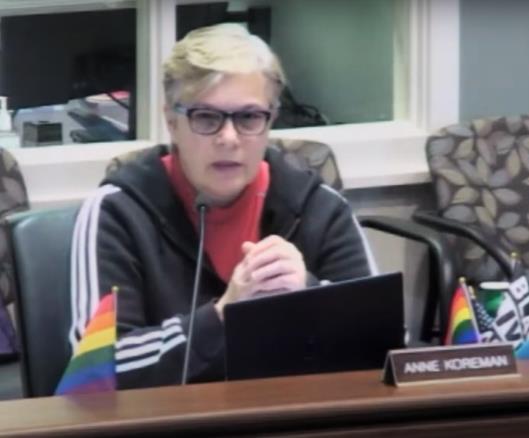
“The present priorities are pretty broad,” Dawson countered. To Dawson, priorities rising to her highest importance are those that address “long-term critical needs and identified gaps in local services,” like child care, affordable housing, broadband, and climate change.
“We may have different ideas about what’s important,” Dawson asserted, at that point targeting her words directly at Koreman. “But don’t suggest, as you have, that if somebody doesn’t view it your way they are acting unethically. That’s really crappy.”
“I didn’t say that,” Koreman rebutted, seeking to clarify.
“That’s the implication,” Dawson muttered under her breath.
For her part, Koreman voted to support the vast majority of funding requests, including each of those affecting Enfield. Indeed, Koreman supplied the lone affirmative vote on each of Enfield’s municipal funding requests.
****
As for Enfield Food Distribution’s endangered application, not only may its fund-depleting dollar amount have brought it an unexpectedly low score, but so may have its quest for construction moneys, as opposed to those for more intangible soft-dollar program subsidies that many on the Advisory Committee—or perhaps its consultants—seemed to favor.
“We believe in the merit of all these applications,” Groton’s Shurtleff acknowledged, prior to voting his opposition to EFD’s funding. “But you will find me voting ‘No’ on almost all of these that involve any construction.”
Given majority opposition to the Pantry’s request—EFD has allowed it could accept as little as $1.2 Million and still move forward—one should question whether the committee will even reconsider EFD’s application during its subsequent second-round review. Among the 21 top-dollar applications asking for $250,000 or more, EFD’s sits alongside proposals that secured far-better, if not unanimous committee approval.
Supported top-tier proposals include those of Sustainable Finger Lakes to retrofit mobile homes with heat pumps (6-0 approval), the Human Services Coalition for homelessness assistance (6-0 vote), and a $1.5 Million request by seemingly-flush Cayuga Medical Center for an “Intensive Crisis Stabilization Center” (5-1 support). CMC supposedly claims it could not proceed with the center without full-dollar funding.
The committee ended Tuesday’s meeting a bit undecided as to how it would make further cuts. Chair Klein closed the meeting suggesting that each of the six committee members might “put out a top-20 or top-30 list.” Or, he said, a committee subset could assemble “a package to put before the whole committee.” The process quite obviously remains unstructured. And of course, the full Legislature could eventually upend the committee’s preferences.
Later Tuesday, before the full County Legislature, Klein reported that the committee’s first-round triage had trimmed away as much as 60 per cent of the 80 percent reduction in funding requests needed to be made. But Klein did not clarify as to whether the reduced amount only included those requests which received a majority vote, namely of 4-2 or better. If that’s the case, for Enfield, only the ECC request would remain in the running.
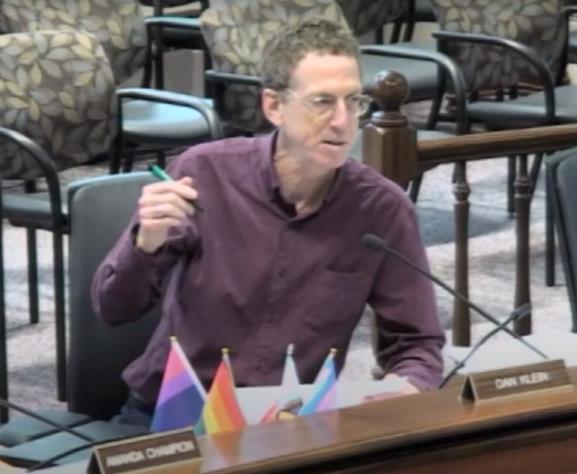
What about proposals, like the Enfield Fire Company’s, where the committee split 3-3? Klein said at one point to the committee regarding its split votes, “Technically, they did not pass. So we have to sort through them one more time. They can be brought up again…. I assume we’re going to look at the ones that have a lot of support. They don’t disappear.”
But the daunting task of culling out the “good” applications from the “truly great” ones appeared to bewilder the Advisory Committee during its assembly line review. Votes sometimes defied reason to the objective, outside observer. Explanations proved few. Without having a scorecard in hand from the County’s paid consultants, decisions, at times, became arbitrary.
Legislator Koreman initially hesitated even to vote on the 120 mid-range applications, stating she’d only received the consultants’ report on Sunday night, some 36 hours earlier. But Klein forced the voting anyway, fearing delay could push final decisions into January.
With just its first round finished, and all 13 legislators holding the final decision, there’s a danger in inserting too much certainty into the committee process at this early point. A majority of lawmakers have yet to weigh in. And public pressure from disgruntled losers could measurably alter the outcome.
Yet, with so much money to cut, committee members found it easier Tuesday just to say “no” than to affirm questionable spending.
“If I start voting ‘yes’ on projects involving construction,” Shurtleff said, referring to the Pantry project, “we’re going to be worn out pretty quick.”
Given that attitude, it may take a miracle to secure Community Recovery Fund money for a new Enfield Food Pantry. Same goes for the Enfield Fire Company bunk room, if not the ECC’s addition as well.
Too many requests for too little money. Perhaps, lobbyists rule. They often do. Stay tuned.
###
Headline: Riley Beats Hochul
Josh Outpolled Governor despite losing NY-19 Race
by Robert Lynch, posted November 11, 2022

Governor Kathy Hochul will take the oath to a new term of office January first. Congressional candidate Josh Riley will not. Both are Democrats. Both secured strong support of their like-minded base. But Riley’s 19th Congressional District includes just eleven of New York’s 62 counties, many of them rural—and red. Governor Hochul’s running field encompassed all 62 of them, including Democratic-deep New York City. That made the difference.
Josh Riley fell short Tuesday in his bid for Congress. Republican Marc Molinaro beat him, unofficially, by more than 6,000 votes and by a couple of percentage points districtwide. The results surprised many a Democrat. But in retrospect, they shouldn’t have. Molinaro had help; help from the political shadows. Most likely, he rode to victory by clinging to coattails, the coattails of Lee Zeldin.
But give Riley some credit. He cut those coattails a bit in county after county. In fact, based on State Board of Elections figures, Riley outperformed Governor Hochul, percentagewise, in each of the NY-19 District’s eleven counties. Put another way, Marc Molinaro proved a weaker candidate for Congress in each of those counties than Lee Zeldin demonstrated as a candidate for Governor.
Lee Zeldin ran surprisingly well upstate. In eight of the NY-19’s counties, Zeldin beat Hochul in the governor’s race. And the Republican Long Island Congressman proved to be the most formidable opponent a Democratic New York Governor has faced in many election cycles.
“The Republican surge in New York, which also rattled Democrats’ hold on state races, did not result in an upset in the contest for governor.” Nicholas Fandos of The New York Times wrote the morning after elections. “But Gov. Kathy Hochul’s five-point victory over Representative Lee Zeldin, a Trump-backed Republican, seemed paradoxically to have a coattail effect for Republicans, who won in areas where Mr. Zeldin performed well.”
Those coattails may have pulled Marc Molinaro across the finish line. Yet the post-election tallies indicate some voters who circled the ballot for Zeldin just couldn’t bring themselves to do the same for the Dutchess County Executive, now Congressman-Elect.
For starters, let’s take Tompkins County, admittedly the bluest outlier of the NY-19 eleven.
Governor Hochul swept Tompkins County with lopsided majorities, Hochul winning 72.1 per cent of the gubernatorial votes cast. But Josh Riley did better. He gained 73.3 per cent of the county’s vote in his own race, 287 votes more than Hochul, according to the state’s numbers posted Thursday. That’s 287 local residents who while voting for Lee Zeldin for Governor, just couldn’t support Molinaro.
Similarly in Cortland: It went “Red” for Zeldin, who secured 57.8 per cent of the gubernatorial vote. But 503 fewer Cortland County voters supported Molinaro than those who did Zeldin. And 395 more backed Riley than voted for Hochul.
The underperformance of Molinaro, percentagewise—and usually in raw numbers—was repeated in county after county:
Broome County: Hochul, 43.5%; Riley, 48.4%
Chenango County: Hochul, 29.5%; Riley, 34.5%
Columbia County: Hochul, 53.7%; Riley, 54.0%
Cortland County: Hochul, 42.2%; Riley, 45.0%
Delaware County: Hochul, 34.8%; Riley, 37.9%
Greene County: Hochul, 37.8%; Riley, 38.4%
Otsego County (part)*; Hochul, 39.9%; Riley, 46.0%
Sullivan County: Hochul, 39.6%; Riley, 40.2%
Tioga County: Hochul, 32.0%; Riley, 36.7%
Tompkins County: Hochul, 72.1%; Riley, 73.3%
Ulster County (part)*: Hochul, 57.0%; Riley, 57.6%
*Part-County components of the 19th Congressional District show gubernatorial percentages for the entire county.
True, the Riley advantage may have shown only at the margins, but it proved consistent throughout the district. Draw this conclusion: Lee Zeldin ran better for Governor than Molinaro did for Congress. And Josh Riley may have lost Tuesday night only because of the political headwinds blowing across upstate.

One additional observation: Josh Riley underperformed on his home turf. Despite its urban flavor, Broome County is not Tompkins. The results indicate a Binghamton-metro political culture that’s more blended. Endicott-native Riley won less than half (48.4%) of the Broome County vote. Marc Molinaro polled at 51.6%. And Lee Zeldin won the county with 56.5 per cent of votes cast.
Democratic candidate mailings in the 19th District hammered Marc Molinaro on his alleged—Molinaro might question it—opposition to abortion rights. Lee Zeldin faced similar accusations. But Democrats’ more single-issue focus against the Dutchess Executive may have driven pro-choice voters decisively to Riley’s side.
****
After initially declining to concede the race until all unreceived absentee ballots had arrived at boards of elections, Josh Riley called it quits Wednesday afternoon, congratulating Molinaro on his win and declaring his quest for Congress over.
“With the ballots cast, votes counted, and campaign ended, it’s important to set aside our divisions and do our best to unite. It’s in that spirit that I wish Marc success as he goes to Washington to serve us and represent us,” Riley’s statement said, striking a conciliatory tone.

The statement continued, “This is not the result we had hoped for, and I’ll be honest: I’m disappointed. But I’m not discouraged. In fact, quite the opposite: this campaign has inspired me. It has been the privilege of my career to build this campaign with all of you and take it across Upstate New York, meeting with so many people who have given me hope.”
Perhaps seeking to draw the abortion fight to an end—or perhaps prodding Molinaro to live up to his promises—the defeated Democratic nominee extended his appreciation for Molinaro’s “commitment to opposing a national abortion ban,” as he did Molinaro’s pledge to create “good upstate jobs,” the issue that had stood as the centerpiece of Riley’s unsuccessful campaign.
“I’m honored to have earned the trust of more than 100,000 voters, and I will work every day to be a worthy member of Congress for both those who did, and did not vote for me,” Marc Molinaro said in a post-victory statement. District residents, Molinaro said, “just want to feed their families, heat their homes, and feel safe in their communities.”
Molinaro’s is a common Republican theme in this Empire State. And it sounds a lot like Lee Zeldin’s.
The 19th Congressional District remains politically competitive. Last spring’s tortured New York redistricting process made it that way. Marc Molinaro will likely face a tough reelection fight two years from now. At that time, a presidential nominee will top the New York ballot. Lee Zeldin will be only a political memory. And in 2024, the coattail effect from which Molinaro benefited this year will be anyone’s guess.
###
Race Over; Riley Concedes
Updated Wednesday evening, November 9, 2022
Democrat Josh Riley will not be going to Congress.
After falling behind when all counties in the newly-redrawn (and drawn again) New York 19th Congressional District were counted, the Endicott native Democratic nominee conceded the House race to Republican Marc Molinaro late Wednesday.

“I’ve called Marc Molinaro to congratulate him on his hard-fought victory, to wish him all the best in Congress, and to thank his family for the sacrifices they’ve made in the spirit of public service,” Riley said in a prepared statement released by his campaign. “With the ballots cast, votes counted, and campaign ended, it’s important to set aside our divisions and do our best to unite. It’s in that spirit that I wish Marc success as he goes to Washington to serve us and represent us.”
Riley’s statement continued, “This is not the result we had hoped for, and I’ll be honest: I’m disappointed. But I’m not discouraged. In fact, quite the opposite: this campaign has inspired me. It has been the privilege of my career to build this campaign with all of you and take it across Upstate New York, meeting with so many people who have given me hope.”
The Associated Press early Wednesday called the 19th District Congressional contest for Republican Marc Molinaro. Riley rolled up a big lead in deep-blue Tompkins County. But in a judicially-redrawn district that spread from Enfield to the Massachusetts border, Riley failed to hold back Molinaro by equally sizeable margins elsewhere.
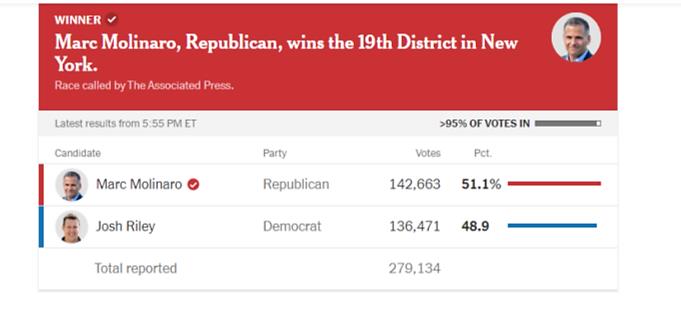
As for Molinaro, confidence ruled:
“The people of upstate New York, they want their voices heard. We want a government that respects us and one that will work to protect us and together we will deliver that for the people of the 19th District,” Molinaro said addressing Republicans gathered to watch returns in the City of Binghamton election night.
Josh Riley began this 2022 campaign running for Congress in an entirely different district, the New York 22nd, a more compact district stretching from Tompkins County to Syracuse. But that was a district that Albany politicians drew. Republicans challenged the legislatively-crafted lines as a Democratic gerrymander. The courts threw them out.
So instead of competing in territory far-removed from his Binghamton-centered base, and one that had placed him in a crowded Syracuse free-for-all, Riley found himself competing in a two-way primary contest against the Hudson Valley’s Jamie Cheney. Riley won that primary handily, but Molinaro proved a tougher General Election candidate than was first thought. Riley ended Tuesday night trailing Molinaro by more than two percentage points.
Some outstanding absentee ballots remain to be counted. But from Wednesday’s concession, it appears the Riley camp saw the odds to victory as just too long.
[Reporter Vaughn Golden of WSKG contributed to this story.]
****
Posted previously:
Tompkins Election; Blue, if not Bluer
Posted November 8, 2022; Updated, November 9, 2022 @ 12:35 AM
Democrats had a good night with state and Congressional elections in Tompkins County. Yet as of late- evening it remained to be seen whether the county’s blue dominance would be sufficient to put its voters’ favorite for Congress on top.

Countywide unofficial tallies released Tuesday evening by the Tompkins County Board of Elections showed Democratic nominees for Congress, Governor and State Senate winning by healthy local margins of over or above 70 per cent.
However, partial district-wide tallies in the hotly-contested New York 19th Congressional District showed a very tight contest. With 634 of the 19th District’s 642 districts reporting shortly before midnight, Republican Marc Molinaro led Democrat Josh Riley 140,580 votes (50.09%) to Riley’s 135,365 (48.23%), slightly more than a 5,000 vote difference.
Other media sources, however, claimed Riley was slightly ahead.
In the three-county 52nd State Senate District, meanwhile, Tompkins County’s Democratic dominance may prove sufficient to carry the Democratic nominee to victory. With 217 of the 52nd District’s 222 election districts reporting near Midnight, Democrat Lea Webb led Republican Rich David 51,027 votes (50.1%) to David’s 49,034 votes (48.14%).
The Tompkins County margins alone put Congressional candidate Riley on top countywide with 73.3 per cent of the vote to Molinaro’s 26.7 per cent. Lea Webb took Tompkins County with 71.5 per cent of the vote, compared to David’s 28.4 per cent.
All vote tallies remain unofficial, and yet-to-be-received absentee ballots could alter the close election night tallies.
Tompkins County joined New York State as a whole in providing Governor Kathy Hochul a full, four year term. In Tompkins County, unofficial tallies gave Democrat Hochul nearly 72 per cent of the vote; Republican Lee Zeldin 27.8 per cent.

The evening results did not break down the vote counts town by town.
In the City of Ithaca, voters continued Democrat Laura Lewis as their mayor, Lewis to finish out the remainder of Svante Myrick’s uncompleted term. With all 14 of the City’s districts reporting, Lewis secured 65.3 per cent of the vote; progressive Katie Sims came in second at 25.3 per cent; Republican Zachary Winn trailed with just 8.6 per cent of the vote.
Ithaca City voters also approved overwhelmingly transition to a city manager form of government, approving a ballot proposition to make the change with nearly eight out of ten voters voting to do so. Supporters of the change numbered 4,380 (79.0%); opponents 1,167 (21.0%).
###
“Henry… You’ll be Remembered”
Granison Tribute Punctuates County Budget Hearing
By Robert Lynch, November 8, 2022
It was a Tompkins County Budget Hearing like none held before, and no doubt, like none to be held ever after.
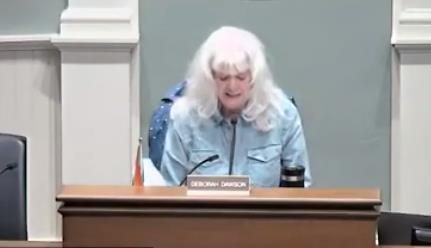
Having received two approving comments, one spoken and another written, on small nuggets of Tompkins County’s proposed $200 Million-plus spending plan, Tompkins County legislators Monday turned away from their budget and took the remainder of their brief hearing down an unorthodox, yet totally understandable path.
For the remaining half of their 18-minute session, legislators shared memories of their departed colleague, Ithaca legislator Henry Granison, who died the prior Saturday, November 5th, of cancer at age 60.
“Henry’s valuable commitment to integrity, trust and diversity will be sorely missed,” Budget Committee Chair Deborah Dawson said from the podium as the evening’s presiding officer. Dawson chaired the Public Hearing in the absence of Legislature Chair Shawna Black, whose own grandfather, by tragic coincidence, had died earlier that day.
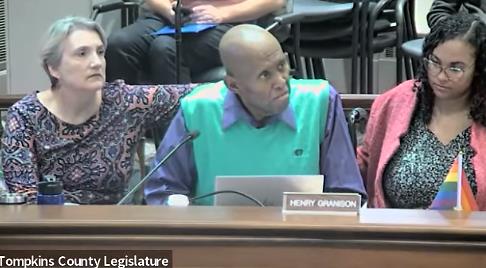
Dawson recalled how she, Shawna Black, and legislators Granison, Amanda Champion, and Anne Koreman—all Democrats and all first elected in 2017—had coalesced as friends and colleagues during their campaigns and when they’d joined the Legislature.
“We got together regularly,” Dawson remembered. “We were pretty excited and very full of ourselves and we were probably pretty obnoxious. We even christened ourselves the ‘Fab Five,’” the Budget Committee Chair continued. “And yes, we were obnoxious.”
Yet Dawson appeared to single out Henry Granison as the most level-headed of the bunch.
“Today, we’re just the ‘Forlorn Four,’ I guess” Dawson said, “because Henry’s passing is a painful loss for us, just as it is for all the County legislators and staff who worked with him over these past five years.”
As she increasing choked back the tears, Dawson ended, “We all send our deepest sympathies to his family, and we hope that their many, many fond memories of Henry will see them through this painful time.”
The two other attending members of that ‘Fab Five,” Legislature members Koreman and Champion, also paid tribute, as did Dryden’s Mike Lane, the County Legislature’s longest-tenured member.
“Frankly I was in awe,” Lane remarked. Lane said he’d learned so much more about Henry upon having read Granison’s obituary and its recounting of his departed colleague’s accomplishments as a lawyer, law school admissions counselor, and instructor of paralegal students at TC3.
“I’m very, very sorry that we’ve lost Henry,” Lane said, Lane admitting he’d not known Granison before Henry joined the Legislature in January 2018. “Since I’ve been on the Legislature,” Lane continued, “I can’t think of anyone we’ve lost who was seated at the time. And it leaves a big hole for all of us. Henry Granison, you’ll be remembered.”
On Lane’s motion, and adopted by consensus, the County Legislature agreed Monday to fly all County Government flags at half-staff in recognition of Granison’s service and mourning his departure.
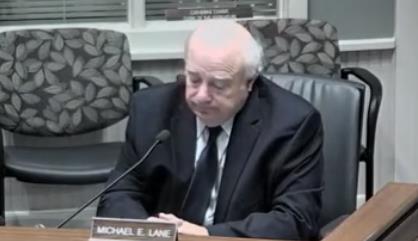
Anne Koreman recalled, “Henry knew what was important: Inclusion, Trust, and Integrity. And he didn’t waiver in that in his whole time.”
“I’m really glad we got just a little slice of his life to spend with him and to be schooled, to learn from him, and to work together,” Koreman added. “Because working together; it’s not something to be taken for granted.”
Koreman said she was grateful that Granison, who tendered his resignation from the Legislature in a tearful parting appearance October 18, got time in his final days to spend it with his family, his dogs, and his favorite sports team, the New York Mets.
Granison’s Third District seat on the County Legislature, a district covering portions of Ithaca’s East and South Hills, will remain vacant pending the outcome of a special legislative election scheduled for January.
###
T.C. Recovery Fund Requests Hit $34 Million
Applications Top 5X the Amount Budgeted
by Robert Lynch, November 1, 2022; additional reporting Nov. 2, 2022
There’s a funny thing about free money. When you give it away, people tend to want it. With its Community Recovery Fund, Tompkins County is finding that out.
“We’re going to have to say no to a lot of people,” Tompkins County legislator Rich John warned Tuesday, as lawmakers learned that applicant requests under the County’s Community Recovery Fund have reached $34 Million, more than five times the amount of grant money available.
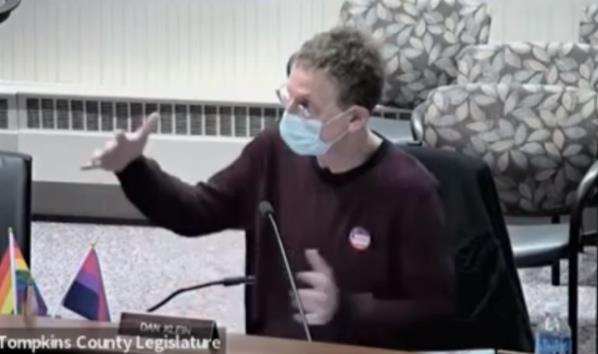
“We’re looking at way, way over the 6.6 Million that we have to give out,” Dan Klein, the legislator whose committee will oversee the community funding requests, told the Legislature’s Tuesday meeting.
With the filing deadline having closed on Halloween, Klein reported that 231 non-profit organizations, qualifying businesses and local governments had applied for the program’s money. 23 of those filed for the highest of the three funding categories, each of them seeking over $250,000.
On Monday, the Enfield Food Pantry’s parent organization announced it is seeking more than $1.6 Million from the Recovery Fund to construct a new food distribution center to replace its existing cramped facilities. Last week, the Enfield Community Council confirmed it’s asked for $206,000 to build a “Mental Health and Community Services Wing” at its community center.
The Enfield Volunteer Fire Company and the Town of Enfield itself have also expressed interest in the Community Recovery Fund, Tompkins County’s funding vehicle for moneys Washington promised it under the American Rescue Plan (ARPA).
A County-paid consultant accepted applications from qualifying businesses, non-profit agencies and local governments throughout October. That consultant, the Rochester-based MRB Group, will now review and score applicant requests according to a complex, multi-criteria formula. MRB’s rankings will then be presented legislator Klein’s committee in a series of 3-hour meetings beginning November 14.
The County Legislature had planned to make the final funding decisions in early-December. Klein suggested Tuesday that the crush of applications may require additional committee review sessions and an extension of the award timetable.
Those legislators who spoke to the matter Tuesday admitted tough decisions—and saddened faces—lie ahead.
“Some of the applicants said we would accept less money,” Klein reported, “and either do a smaller project, or look for money elsewhere.” But the Danby legislator also conceded the inevitable alternative. “Or we’re going to go through some other kind of process where we’re just going to eliminate projects and narrow it down.”
“Can we buy a lottery ticket for power ball,” quipped Mike Lane, a legislator not known for cracking jokes.
“I don’t believe ARPA regulations permit that,” Klein answered dryly. “Next question please.”
Somebody chuckled. But for those whose applications lie in the hopper and whose hopes hang in the balance, Lane’s attempt at subtle humor may have backfired.
Of the 231 applicants who met the October 31st deadline, Klein reported 80 had filed for the lowest funding category, $25,000 or less. The largest number, 128, sought mid-range funding of $25,000 to $250,000. 23, including the Enfield Food Pantry’s parent, are reaching for the highest totals, a Quarter-Million Dollars or more.
Klein said that the applicant field could be narrowed as MRB’s consultants may throw out some candidates who don’t legally qualify. He estimated perhaps 200 would remain eligible.
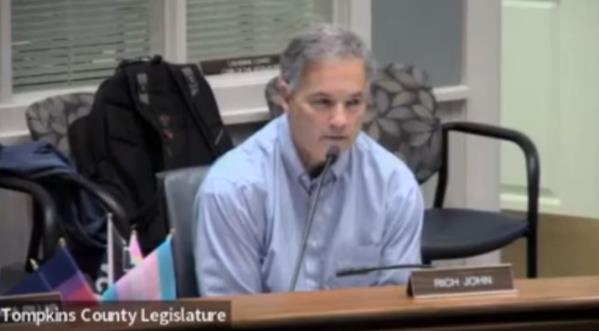
In the summer of 2021, federal authorities awarded nearly $20 Million to Tompkins County Government through the American Rescue Plan. Initially, thrift-conscious leaders planned to divert all of the Washington windfall to “government operations,” with as much as half of it for future capital construction. Pressured by community groups, some liberal lawmakers, and the public, the Legislature set aside nearly $7 Million for charitable funding as an afterthought. And for a while, the Recovery Fund hand-outs were to be paid from the County’s own fund balance, not ARPA.
While legislators Tuesday mourned the fact that demand for Recovery Fund moneys had far outstripped supply, no one suggested that legislators revisit the funding total or allocate more of Uncle Sam’s money to satisfy burgeoning demand. Earlier talk of successive funding rounds has been largely forgotten.
“I think we’ve struck a nerve in the community,” Rich John observed. “Be careful for what you ask for. We’re going to have to say ‘No’ to a lot of people and organizations and that’s going to be hard.”
Yet the Ithaca City legislator also attempted to paint an optimistic smile on news that could be met in many circles with a collective frown.
“I think we’ve triggered something really, really useful in getting the grass roots community organizations and individuals to think about where they want us to go and how we could be a better county,” John observed. “And that could be really, really exciting.”
“Yes, it’s always exciting looking forward to disappointing people,” interjected Budget Committee Chair and fiscal hawk Deborah Dawson, who ran Tuesday night’s meeting in Legislature Chair Shawna Black’s absence.
Rich John smiled. Legislators chuckled. Yet, again, for some, the joke may have fallen flat.
****
“It’s a big one,” Enfield Councilperson Robert Lynch (this writer) acknowledged earlier in the meeting as he advised the Legislature of Enfield Food Distribution’s $1.66 Million Recovery Fund application to construct an expanded Food Pantry with ample parking, a demo kitchen, and 6,800 square feet of space.
“We are cramped,” said Lynch, a Pantry volunteer. “During most times of the year, we have to distribute our produce outdoors because we have no room inside to distribute it…. I’m there Mondays. I’m distributing food, and sometimes we all get rained on.”
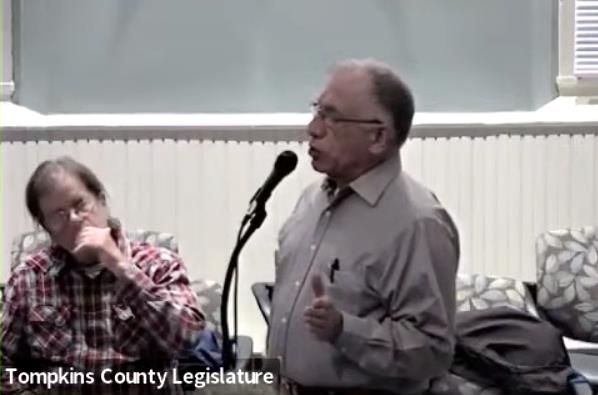
In addressing the dilemma likely to face top-tier applicants, Enfield Food Distribution’s hefty financial filing adopts a fallback position. “With design adjustments,” its application states, “we believe it will be possible, though not ideal, to complete the project with an award of 1.2 million dollars.”
Enfield Food Distribution’s ambitious plans call for acquiring a new site, starting the new pantry as soon as next February, and completing it by July 2024.
“Rather than addressing the growing need for our services by only increasing the amount of food we provide,” the group’s application states, “we want to expand and provide other services with the aim of addressing the root causes of food insecurity. We are evolving from a charity model to one of empowerment.”
As Tuesday’s discussion of the Recovery Fund’s overflowing inbox proceeded toward its close, Lansing’s Mike Sigler suggested a potential safety valve: the enlisting of Congressional or State legislative staffers to identify alternate funding sources.
“Robert Lynch was talking about the Food (Pantry),” Sigler reminded colleagues. Congressional staffers, he said, “may think, yeah, food pantries are in this pot of money. I don’t know that’s the case, don’t quote me on that, but there may be stuff like that.”
Sigler was reminded that combined applicant paperwork already totals several thousand pages, and that confidentiality rules may restrict sharing. Yet the Lansing rep remained undeterred.
“I’m not saying they need to evaluate each proposal,” Sigler stated. “But they may just on its face go, ‘yes, that actually fits into this.’”
Ulysses’ Anne Koreman suggested what she called a “hybrid” process whereby experts could help applicants denied Recovery Fund assistance tap other sources.
“Let’s hold your hand and connect you to where you could get more funding,” Koreman suggested.
In other legislative business Tuesday:
Although it probably stood as the evening’s most significant action, a change in the Charter merging the County’s Public Health and Mental Health Departments into the “Department of Whole Health” breezed to approval almost without notice. The merger was first conceived more than five years—and two County Administrators—ago, when Joe Mareane was Administrator. COVID-19 sidelined its formal approval for much of the interim.
Officials view the departmental merger as a nod to efficiency. With no Mental Health Commissioner on the payroll, Public Health Commissioner Frank Kruppa will likely oversee the newly-combined department. No brick-and-mortar changes are planned.
The lone obstacle to final action Tuesday proved strictly semantic. A Public Hearing commenter faulted the drafted new language for failing a test of political correctness. Legislators rushed to the ready, changing the scripted term “mentally disabled” to the less judgmental “those with mental health conditions.”
“I would agree that that is outdated language, but it is language that is used in the Mental Hygiene Law, unfortunately,” Kruppa said of the non-P.C. classifier.
Embracing the progressive substitute, yet fearing legal repercussions unless and until Albany’s wordsmiths grow in enlightenment, the Legislature substituted the new phrase in the Charter, yet kept the older term in parentheses and quotes.
“Yeah, lawyers ruin everything,” meeting Chair Deborah Dawson observed.
There was a second action that could have prompted debate, but didn’t. Legislators approved another annual increase in the countywide solid waste disposal fee, raising the charge from $75 to $80 per household beginning next year.
Some complain that the solid waste charge has become a stealth, regressive tax. It’s been rising by about $5.00 per year for a while. Dryden’s Mike Lane often objects to the increases. Although he again did so this year during budget deliberations, Lane said nothing about it Tuesday, and he joined in the unanimous vote to up the charge.
###
November News Briefs:
Senior Break Approved:
(Nov. 19): The law required a Public Hearing. But no one spoke to object November 9th as the Enfield Town Board invited comment, and then approved raising the income eligibility limit for a Senior Citizens’ discount on Town property taxes.
For many years, Enfield had set the income ceiling at $24,000 for older homeowners and the disabled to receive a 50% reduction on the Town tax. Until this year, New York allowed senior incomes of no higher than $29,000 to qualify.
But in August, Governor Hochul signed legislation raising the allowable exemption significantly. Tompkins County hiked its own limit to $35,000 in response. After studying several options, the Enfield Board agreed to set the same level as a kind of Goldilocks compromise.
Under a stair step formula established by the State, Enfield seniors with incomes as high as $43,400 will also now be eligible for exemptions of something less than 50%
Sadly, the limit can’t be enjoyed before the January 2024 tax bills. Eligible seniors will need to apply before next March 1st and may receive a notice from the County Department of Assessment encouraging them to do so.
###
Norbut PILOT Delayed; Project Faulted:
(Nov. 13): As expected, the Tompkins Country Industrial Development Agency (IDA) November 9 delayed by one year the beginning—and the end—of Norbut Solar Farms’ Payment in Lieu of Tax (PILOT) abatement for its Enfield solar farm off Applegate Road. Norbut maintains supply chain delays have kept it from installing panels until next year. If the IDA had not acted, Norbut would have lost money on the project’s back end.

“But they have begun construction,” Enfield Councilperson Robert Lynch (this writer) told the IDA’s Wednesday meeting. “They subcontracted to a construction company, and they stripped the whole land of all the trees. It is a great concern to the people on the Enfield Town Board that they basically left the site all weedy and a moonscape. “
“This body provides financial assistance, and it does not provide site plan approval,” IDA Executive Director Heather McDaniel responded. “It does not have any control over construction, unfortunately.”
Later that day, the Town Board moved forward in rewriting Enfield’s Solar Law, in part, to correct problems the Norbut adventure has laid bare.
###

